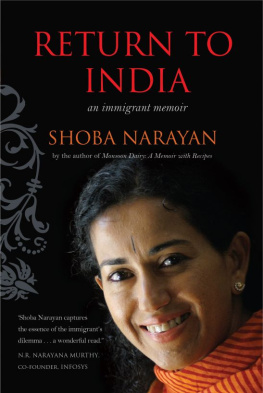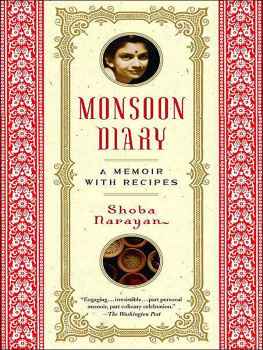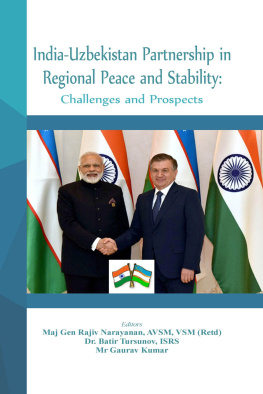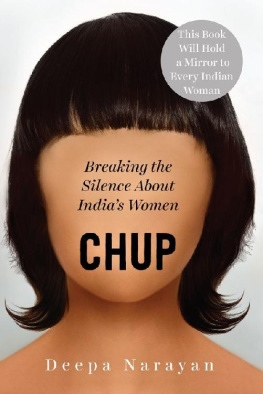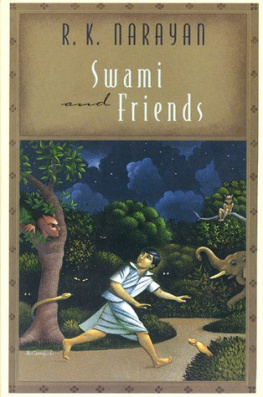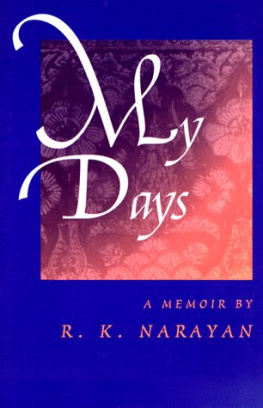Return to India
An immigrant memoir

by
Shoba Narayan
Return to India: An Immigrant Memoir
Published by Jasmine Books at Smashwords
Copyright 2012 Shoba Narayan
All right reserved under the Internationaland Pan-American Copyright Conventions.
Shoba Narayan asserts the moral right to beidentified as the author of this book.
No part of this publication may bereproduced, stored in a retrieval system, or transmitted, in anyform or by any means, electronic, mechanical, photocopying,recording or otherwise, without the prior permission of theauthor.
Parts of this book first appeared in IndiaKnowledge@Wharton in 2007
A section of this book was first published inNewsweek, March 13, 2000 issue under the title, Was it me or wasit my sari?
Cover Designer: Ajanta Guhathakurta.
Book Designer: Maureen Cutajar.
Dedicated to
Padma and V. Ramachandran
You are the reason we came home
Other books by the same author
Monsoon Diary: a memoir with recipes.
Praise for Return to India
Shoba Narayans Return to India is awonderful read. She captures the essence of the immigrants dilemmain her own expressive style. A memoir that is as once inspiring tothose settled abroadwho are thinking of coming backand reassuringto those who have come back.
N.R. Narayana Murthy, co-founder,Infosys.
Praise for Monsoon Diary: a memoir withrecipes
This is fresh wonderful writinga mouthwatering story from a gifted storyteller.
Saveur
Monsoon Diary is ultimately a story aboutbeing Indian and carrying the traditions into a new world.
Travel + Leisure.
Contents

Prologue

R eturn to India isa topic that consumed me for about ten years. I was living in NewYork at that time, part of a community of Indians, all of whom werein the midst of this conflict. This book is written for them: forthe Indian Diaspora in America, the UK, Singapore and elsewhere,who wrestle with the R2I question. This book is also written foranother set of Indians students in Delhi, Mumbai, Pune,Chandigarh, Coimbatore, and countless other Indian cities; men andwomen who are young and ambitious, and cannot wait to leave theirhomeland for foreign shores. I used to be one of them. I want totell them what its like on the other side. I began writing this inNew York ten years ago and finished it in India.
This is a book about an immigrants dilemma,written by an immigrant for an immigrant. It is about my dream ofreturning to the homeland. Other Indians share this dream toomostrecently Bollywood diva, Madhuri Dixit, and her family andperhaps all immigrants fantasize about riding back home on gildedhorses with gold coins, to the sound of applause from adoringfamilies. They may do nothing about this dream; they may not speakof it. Some eventually disdain or discard it. But for others, itfesters at the back of their minds, rearing its head at randommoments, till as it did for me it becomes an obsession. Go backhome, go back home and like in the film, ET, we say homehome
Home: a word filled with loss and longing.Snatches of music bring to mind a mothers song. Smells inrestaurants conjure up a kitchen back home. A face in a crowd lookslike a relative. Birthdays, anniversaries and other milestonesbring guilty reminders of aging parents and the relentless march oftime. A tug of war between two cultures New York or New Delhi, SanFrancisco or Santo Domingo, Toledo or Taipei. A competition betweencountries with no clear winner; a championship game for the titleof Home.
When I was an immigrant in America, homefor me was a mlange of memories that had softened with time into ahappy haze, like an Impressionist painting. There were people inthis painting: iconic figures like my grandmother, dead and gonelong enough to be elevated to the status of a benevolent ancestor.There were others who remained like my parents, in-laws, aunts anduncles, slowed by age but resolute nonetheless, with laugh linesand worry warts, marking a life lived with character and charm; witand wisdom. There were physical places and wide-open spaces. Mostdelightful of all were the scents and tastes of childhood thefragrance of blooming night jasmine, dew wobbling on a lotus leaf,tinkling cowbells, shrieking parrots, the taste of cilantro, cuminand ginger all of which imbued me with a powerful longing for theland that is called India, but which I call home.
My own relationship with the two countries Ihave called home is complicated. My love for India is one that achild feels for her mother, albeit a chaotic, unwieldy, harassedmother who doles out exuberant affection and unpleasant surprisesin equal measure. My admiration for America is what one feels for aperfect, if emotionally detached, father part hero-worship, partreproach. I respect many things about America, and therefore holdit to very high standards. I expect it to be more moral and morejust than other nations. When it perpetrates or even toleratesinjustice, I am crushed. Because I put America on a pedestal, itsometimes falls short. Because I take India for granted, itsometimes surprises me pleasantly. Indias unchanging waysfrustrate me. Americas impenetrable core flummoxes me. I cantescape India, but America sometimes escapes me.
The problem for immigrants like me is thatwe are equally at ease in two disparate cultures and, therefore,fit into neither. We belong to both countries, yet choose neither.Most of us end up in a no-mans-land, neither here nor there, in anangst-filled limbo. We remain immigrants forever, unlike ourforefathers who swore allegiance to one nation due to political oreconomic repression.
In generations past, life in the old countrywas a struggle. Immigrants to America were fleeing revolutions thatstripped them of title and property and threatened their life andliberty. They were the pregnant women who threw themselves onboats, willing to submit to raging seas and the risk of drowning,just so that they were afforded the opportunity to be rescued bythe US coastguard and their babies, the right of US citizenship.They were the desperate refugees who begged, borrowed and paidtheir entire life savings to visa agents, only to be told that theyshould flush all their papers down the airline toilet and land inAmerica uttering two words, Political asylum.
My path to America did not involve anythingas drastic as jumping fences, crossing borders in the middle of thenight, or overstaying a tourist visa and slipping into the shadowworld of illegal immigrants for years on end. Mine is not a talepopulated by bloodthirsty dictators, rampant epidemics, boatpeople, barking dogs and blood-smeared fences. I am neither apolitical exile nor an economic refugee. I went to America merelyas a student seeking opportunities. Yet, I believe that my journeyis emblematic of countless others. My dilemmas reflect those ofmany an immigrant today.
What is home anyway? Is it a place, aperson, or merely a fleeting memory? Can one ever go back home oris such a trip fraught with disappointment? I didnt know theanswers when I began asking these questions and perhaps, there isno one answer to questions so individual. Along the way, I found nouniversal truth, no personal path to salvation. But in themeantime, I discovered many things about life and loss, aboutrisking it all and making do, and about my place in the world.

